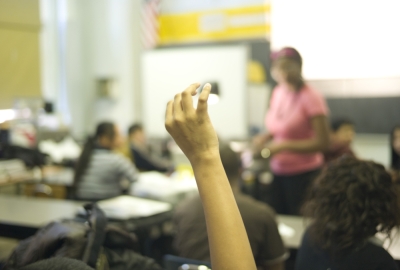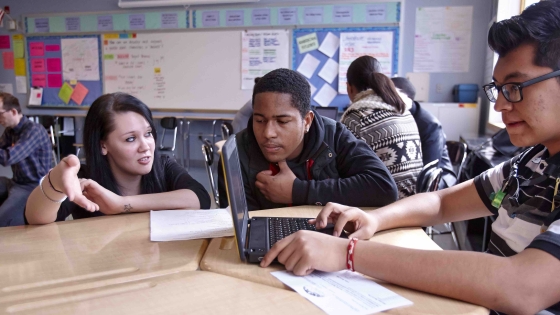
The Research Alliance conducts rigorous studies on topics that matter to the City’s public schools. We strive to advance equity and excellence in education by providing nonpartisan evidence about policies and practices that promote students' development and academic success.
The Research Alliance fulfills three core functions:
- Conducting rigorous, applied research in collaboration with policymakers, educators, and other stakeholders.
- Maintaining a unique archive of longitudinal data on NYC schools and communities, to support ongoing research; and
- Communicating the results of our work to multiple audiences here in NYC and around the nation.
Guiding Principles
The Research Alliance is distinguished by a number of guiding principles and related organizational capacities. These include:
A focus on one place—New York City
In a district as large and diverse as NYC, understanding the local context is no small feat. Research Alliance staff have worked in a broad cross-section of NYC schools. We have relationships with educators, policymakers, nonprofit service providers, and community members in all five boroughs. We regularly participate in meetings and forums that help us stay abreast of emerging issues and conditions in the City’s schools.
Genuine engagement with education stakeholders
Historically, the work of education researchers has been largely disconnected from that of policymakers and practitioners. Research findings have often done little to influence policy or improve day-to-day practice in schools. The Research Alliance is one of a growing number of research-practice partnerships around the country attempting to bridge this divide.
We engage stakeholders and partners in all phases of our work—from setting research priorities, to developing studies, to interpreting and reporting on results. By actively collaborating with educators, school district officials, and youth-focused nonprofits, the Research Alliance seeks to address the most pressing challenges facing NYC students and schools. We make a point of asking questions not only about whether education policies and practices are effective, but also about why, for whom, and under what circumstances.
A formal data-sharing agreement with the NYC DOE enables Research Alliance staff and collaborators to conduct in-depth studies and analyses using large quantities of data from the City’s 1,700 public schools. We provide regular briefings about our work and share our findings and recommendations in forms that are as accessible and useful as possible for policymakers, practitioners, and the general public.
High standards of scientific rigor
The Research Alliance strives to meet the highest standards of education science in our work—maximizing the validity and reliability of our findings. In practical terms, this means thinking critically about the methods we use to answer a question, identifying sources of bias in our results, and considering a full range of potential explanations for patterns we see in the data. When we conduct descriptive research, we make careful sampling and analytic choices, aimed at providing as much clarity and transparency as possible about the conditions and trends we are studying. When assessing the effectiveness or impact of specific programs or policies, we employ research designs and statistical techniques that support causal inferences about how the program or policy affected student and teacher outcomes (e.g., randomized controlled trials, regression discontinuity analyses, comparative interrupted time-series analysis). We use qualitative and mixed-method research to gain a rich understanding of the underlying reasons for a problem; to uncover specific school processes and relationships; and to learn about the perspectives of students, parents, teachers and other stakeholders. We ensure rigor in qualitative work by cross-referencing data from a variety of sources, developing protocols and coding schemes that allow for the testing of multiple hypotheses, and attending to inter-rater reliability.
A variety of external partners contribute to and help vet the Research Alliance’s work. This includes other researchers here at NYU, as well as experts from other universities and organizations across the city and country. When we report findings, we explicitly address potential limitations, and we try to ensure that our conclusions and recommendations are always firmly grounded in the evidence resulting from our analyses. We also work to build evidence over time, putting findings from individual studies into the context of larger, growing bodies of work.
Our longitudinal data archive, which is the largest and most comprehensive of its kind
Large-scale quantitative research projects depend on procuring and preparing large data sets. When working on education issues, this can be particularly complicated and time consuming because of complex regulations about sharing student data, as well as important concerns about students’ privacy. School districts often do not have the time, resources, or expertise to process the vast amounts of data they collect. The Research Alliance helps solve these problems in NYC—by building, maintaining, and analyzing an archive of longitudinal data about NYC schools and communities. We have a formal agreement with the NYC DOE, which outlines the data we receive, the process we use to obtain it, and the security measures we use to keep it safe.
Our archive is among the largest and most comprehensive education databases in the country, including administrative, human resources, and School Survey data from the DOE, dating as far back as 1989. In addition, we compile information from public agencies, such as the U.S. Census Bureau and the National Center for Educational Statistics, and we collect survey and interview data through our own projects. Our ongoing communication with the DOE, as well as our team’s years of experience working with DOE data sets, allows us to quickly transform data into researcher-friendly formats, safely stripped of identifying information and suitable for analyses.
A commitment to advancing racial justice and equity
The Research Alliance’s work addresses multiple, intersecting forms of educational inequality, including disparities associated with race and ethnicity, poverty, gender, language, immigration status, and disability. In this context, we believe that racial inequality demands particular attention. Systemic racism manifests in every sector of American life, including our nation’s education system. New York City’s intensely segregated schools reflect this reality. Research Alliance studies have consistently highlighted that students of color, and our Black students in particular, have less access to high-quality learning opportunities and face steeper barriers to academic success. Addressing these problems is central to “advancing equity in education”—and thus a core part of the Research Alliance’s mission.
We strive to advance racial justice in education throughout the research process, including by:
- Actively supporting the work of scholars of color on our staff and in our partnerships;
- Engaging diverse groups of stakeholders as we develop and implement studies and interpret results;
- Communicating findings from our work in ways that are meaningful and accessible to diverse audiences; and
- Conducting research that:
- Draws attention to unequal outcomes and opportunities for NYC students;
- Provides information about the causes and consequences of racial inequality in NYC schools;
- Elevates the voices of students, families, and communities who have been marginalized in education research and policy;
- Identifies levers that hold promise for improving racial equity in NYC’s education system; and
- Assesses and provides feedback on specific programs and policies aimed at improving equity in NYC schools.
A belief in the value of inclusion and diversity
The Research Alliance seeks to create and be part of a diverse professional community, representative of and working in service to NYC's public schools. We work to cultivate an inclusive and supportive environment within our organization. As a staff, we foster honest relationships and discussion of our differences. We accept and respect one another with full acknowledgement of our unique backgrounds (including, but not limited to, our ethnic and racial identities; gender differences; LGBTQIA identities; socio-economic status; age; physical abilities; religious/political beliefs; and diversity of life experiences).
The Research Alliance recognizes that our individual backgrounds shape our biases and influence the assumptions we make as researchers. For this reason, we believe that diverse staff perspectives can improve our organizational culture and strengthen our work on behalf of New York City. Similarly, the close connections we forge with stakeholders allow for varied experiences and perspectives to inform and enhance our work.
Clear communication of findings to a range of audiences
We view communication as a continuous process that begins when we determine which research questions to address and culminates with sharing research findings. We build relationships with policymakers, educators and community groups; solicit their input about our work; and provide them with information they can use to do their jobs more effectively. For example, we create customized reports with data and recommendations for individual schools in many of our studies, helping them identify where they are succeeding and where they need to improve. We conduct regular briefings about the progress of our research, so our partners have ample opportunities to preview, ask questions about and provide feedback on our findings.
We also serve as a public resource, providing credible, independent analyses and information about the City’s school system. We regularly publish our findings and recommendations in reports, articles and policy briefs, which we work to make as clear and accessible as possible. We also disseminate our work through our website, social media, outreach to the press, presentations, and events. Our staff is always willing to answer questions, frequently going out of their way to produce helpful information for students, policymakers, journalists, and others.
Multiple funding sources to help ensure our independence
While we work closely with a variety of education stakeholders, the Research Alliance carefully guards our independence. We receive funding from diverse public and private sources—supporting both specific projects and general operations. This helps ensure that we are not limited to projects that align with any particular agenda. As a research center housed at NYU, we benefit from a robust institutional infrastructure as well as a commitment to academic freedom and sharing of information and ideas. Our Steering Committee is characterized by a wide range of perspectives on key issues, including representatives from the NYC DOE, the teacher and administrator unions, academia, and business and community groups.
A firm commitment to nonpartisanship
Tied closely to our independence is our nonpartisan stance. The Research Alliance seeks to produce credible, reliable evidence for stakeholders across the political spectrum. Our work is not affiliated with any political party, policy agenda, or ideology. Good research requires a firm grasp of historical context and clarity about the systems of privilege and oppression that shape students’ experiences—this territory is often politically fraught, but need not be “partisan.” The Research Alliance is careful to come to the assessment of specific policies and programs without a predetermined judgement about their value or effectiveness, aside from their worthiness of study. We aim to be as transparent as possible about our principles, goals and assumptions, and to provide a full discussion of relevant facts, enabling stakeholders to reasonably draw their own conclusions about what our findings suggest for policy and practice.

